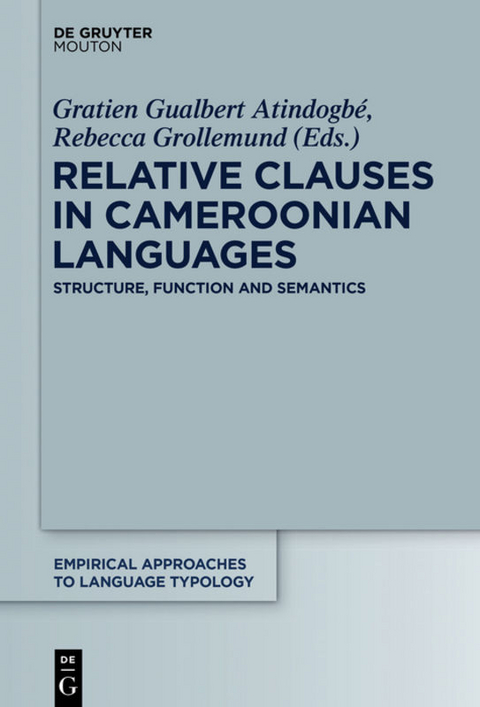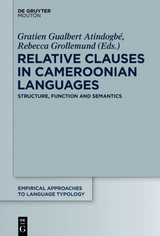Relative Clauses in Cameroonian Languages
Structure, Function and Semantics
Seiten
2017
de Gruyter Mouton (Verlag)
978-3-11-046761-1 (ISBN)
de Gruyter Mouton (Verlag)
978-3-11-046761-1 (ISBN)
The series is a platform for contributions of all kinds to this rapidly developing field. General problems are studied from the perspective of individual languages, language families, language groups, or language samples. Conclusions are the result of a deepened study of empirical data. Special emphasis is given to little-known languages, whose analysis may shed new light on long-standing problems in general linguistics.
This volume is a series of nine (9) contributions to our understanding of relativization strategies in eleven (11) languages of Cameroon spread into the seven (7) sub-branches of the Niger-Congo phylum: Ekoid, Mambiloid, Mamfe, Mbam, Narrow Bantu, Wide Grassfields, Yemne-Kimbi. As a productive strategy in the world’s languages, and considering the evidence that the African language are either under-described, poorly described or not described at all, investigations into the forms, structures and functions of relative clauses and relativization start filling the gap of the absence of analytical descriptive works on the topic. The papers dwelt on the construction of relative clauses, their structure and constraints, their morphosyntactic properties, how they are used to give prominence to topics or participants that are thematic in a given discourse, and to mark the boundaries of units of text, and the formal characteristics of restrictive relative clause constructions. The findings generated so far constitute an endless tank for many fields of hyphenated linguistics including general linguistics, cognitive linguist, applied psycholinguistics, psycholinguistics, neurolinguistics, cognitive psychology, linguistics and pragmatics.
This volume is a series of nine (9) contributions to our understanding of relativization strategies in eleven (11) languages of Cameroon spread into the seven (7) sub-branches of the Niger-Congo phylum: Ekoid, Mambiloid, Mamfe, Mbam, Narrow Bantu, Wide Grassfields, Yemne-Kimbi. As a productive strategy in the world’s languages, and considering the evidence that the African language are either under-described, poorly described or not described at all, investigations into the forms, structures and functions of relative clauses and relativization start filling the gap of the absence of analytical descriptive works on the topic. The papers dwelt on the construction of relative clauses, their structure and constraints, their morphosyntactic properties, how they are used to give prominence to topics or participants that are thematic in a given discourse, and to mark the boundaries of units of text, and the formal characteristics of restrictive relative clause constructions. The findings generated so far constitute an endless tank for many fields of hyphenated linguistics including general linguistics, cognitive linguist, applied psycholinguistics, psycholinguistics, neurolinguistics, cognitive psychology, linguistics and pragmatics.
Gratien G. Atindogbé, University of Buea, Cameroon; Rebecca Grollemund, University of Missouri, USA.
| Erscheinungsdatum | 15.09.2017 |
|---|---|
| Reihe/Serie | Empirical Approaches to Language Typology [EALT] ; 58 |
| Verlagsort | Basel/Berlin/Boston |
| Sprache | englisch |
| Maße | 155 x 230 mm |
| Gewicht | 573 g |
| Themenwelt | Geisteswissenschaften ► Sprach- / Literaturwissenschaft ► Sprachwissenschaft |
| Schlagworte | Head Marking • relative clause • Relativisation • Resumptive Pronouns |
| ISBN-10 | 3-11-046761-5 / 3110467615 |
| ISBN-13 | 978-3-11-046761-1 / 9783110467611 |
| Zustand | Neuware |
| Haben Sie eine Frage zum Produkt? |
Mehr entdecken
aus dem Bereich
aus dem Bereich
Das umfassende Standardwerk auf der Grundlage der aktuellen amtlichen …
Buch | Hardcover (2024)
Duden (Cornelsen Verlag)
35,00 €




